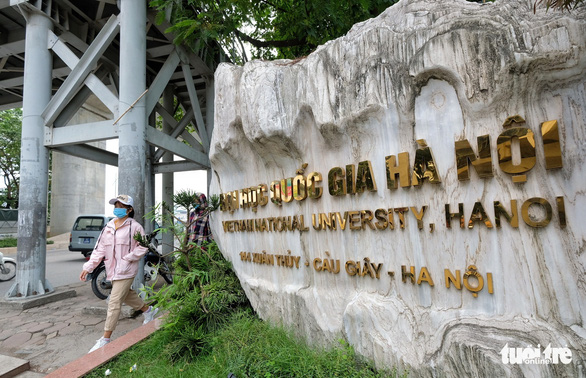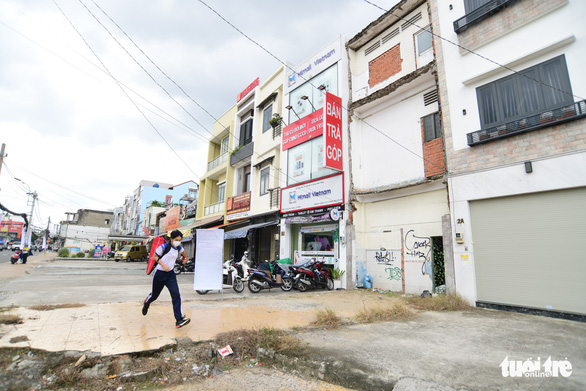Many experts have called the slow disbursement of ODA and concessional loans a ‘chronic disease’ that can only be healed through drastic changes to the bureaucratic process.
A complicated process
According to the Ministry of Finance, the disbursement rate of foreign loans reached over 15.4 percent – far lower than expected – as of August.
During the first eight months of the year, six ministries and eight localities failed to disburse any of their allocated capital.
In total, 17 ministries and provinces and cities fell short of meeting their disbursement plans and proposed that the Ministry of Finance accept the return of a combined VND6.8 trillion (US$284.2 million) in ODA and concessional loans.
Dao Viet Dung, head of the Plan-Finance Department under the Ministry of Construction, one of the six ministries unable to disburse its ODA loans between January and August, blamed the issue on the ministry’s failure to hold tenders for projects.
This year, the ministry was assigned to execute eight ODA projects at a cost of some $31.9 million, $23.4 million of which was meant to be disbursed this year.
The ministry also had plans to carry out an ODA project in partnership the Directorate of Vocational Education and Training, but it has proposed returning the money already allocated for the project to the state budget.
Similarly, the Ministry of Industry and Trade has fallen short of its disbursement expectations.
Its disbursement rate for the VND825.2 trillion ($34.5 billion) it was allocated for the year is just 14.8 percent.
According to the ministry, slow disbursement is the result of the overly bureaucratic process required to use ODA capital for equipment purchase.
This process includes developing a list of the equipment needed for a project, appraising the prices of equipment, approving the equipment list, creating a plan to choose contractors, preparing and approving bidding dossiers, seeking a consensus from project sponsors, and holding international tenders.
The ministry must also have sponsor approval to make the final contractor selection and advance capital.
A particular obstacle the ministry faces is partnering with consulting units capable of properly appraising the prices of equipment, thus creating a significant roadblock in the disbursement process.
Other hinderances are far more complicated.
State management agencies, for instance, must approve project plans and develop budgets within 30 days of a project’s submission.
Additionally, they are required to approve fire prevention and fighting plans within 10 days.
Such requirements are simply unrealistic given the current backlog of projects in need of approval at various state management agencies.
In addition, the process of holding tenders to choose contractors typically lasts just 30 days, but if issues arise with project approval plans, the tenders must be held again.
Furthermore, the handover of land for projects in hi-tech parks is consistently hindered by slow compensation for landowners and delays in site clearance.
According to Le Van Han, chairman of Tra Vinh Province in southern Vietnam, loan borrowing procedures are overly complicated.
Tra Vinh was amongst the list of provinces with a slow rate of disbursement of ODA and preferential loans.
Chau Van Hoa, director of the provincial Department of Planning and Investment, illustrated the issue by describing an ongoing project to provide medical equipment for Tieu Can District General Hospital.
To date, the contractor for the VND47 billion ($2 million) project has yet to hand over and install equipment as committed in its contract with the province.
These delays were caused by a need to substitute or supplement equipment in order to keep up with technological development.
The investor of the project sought permission from the National Institute of Medical Device and Construction under the Ministry of Health to import devices from South Korea but “after getting the permission, we have to wait for disbursement from the banks. It takes a lot of time,” said Hoa.
In Tra Vinh, a VND42.1 billion ($1.76 million) project launched in 2022 to develop a medical service supply system had its estimated costs approved in 2020.
|
|
| The Vietnam National University-Hanoi has a much lower public investment disbursement rate than expected. Photo: Nam Tran / Tuoi Tre |
However, the estimation exceeded the ODA capital allocated to the project by over VND6 billion ($250,988) due to the high prices of building materials.
This forced the province to revise the plan and, therefore, restart the contractor selection process.
Moreover, an official of the project management board in charge of purchasing equipment resigned and the Department of Health is still seeking a replacement.
Similar woes exist in other provinces and cities across the country.
A representative of the Department of Finance of Nam Dinh Province in northern Vietnam said that the Vietnam Improved Land Governance and Database Project in Nam Dinh, meant to be funded with over VND6 billion ($250,988) in loans from the World Bank (WB), is stalled because contractors have yet to complete their acceptance of the completed workload in order to pave the way for the funds to be disbursed.
This hold-up was caused by a resurgence of the COVID-19 pandemic in the province during the first quarter of this year.
The WB only accepts completed workloads once a project is put into use.
Therefore, although 70 percent of the work packages required for the project have been finished, acceptance and payment cannot be done.
Regarding a Local Road Assets Management Project, on January 13, the prime minister issued a decision to adjust the investment plan, allowing Nam Dinh, Lao Cao, and Lang Son Provinces to use surplus funds created by shifting exchange rates.
Nam Dinh is till completing proposals to borrow the funds from the Ministry of Finance.
Slow execution
Duong Van Can, vice-chairman of the Vietnam Association of Construction Contractors, said the escalation of material prices has caused many projects to be delayed.
Because contractors face a high risk of losses, they are choosing not to execute projects at full pelt.
Early this year, the association wrote to the prime minister and the Ministry of Construction to propose adjustments to the prices of building materials.
However, under prevailing regulations, lump-sum contracts are required. For these kind of contracts, contractors are not allowed to adjust the unit prices of materials, affecting the progress of packages as well as capital disbursement.
Economist Dinh Tuan Minh explained that ODA loans are borrowed by the government. Once disbursed, the loans are part of the state budget. If the loans are not disbursed, the government and relevant localities still have to pay loan interest.
According to Dr. Vo Tri Thanh, director of the Institute for Brand and Competitiveness Strategy, the disbursement of ODA loans has been very slow over the past few years due to the policies of creditors as well as Vietnamese regulations.
|
|
| The second metro line project in Ho Chi Minh City linking Ben Thanh Market in District 1 and Tham Luong Depot in District 12 has lagged behind schedule and loan contracts for it has expired, but work on the project has yet to start. Photo: Quang Dinh / Tuoi Tre |
Strict sanctions needed
Associate Professor Dr. Ngo Tri Long, former director of the Price and Market Research Institute, said that the slow disbursement of ODA and concessional loans has caused great waste because these loans still require interest payments. The dead capital shows the irresponsibility of project managers and executors.
There are many reasons for late disbursement, such as overly complicated procedures, new policies, and slow site clearance. Increasing land prices have also impeded the compensation and site clearance process.
Dr. Nguyen Quang Viet, deputy director of the Vietnam Institute for Economic and Policy Research under the Vietnam National University-Hanoi, shared Long’s view that the disbursement of ODA and concessional loans, as well as state capital, is at a snail’s pace.
He attributed such slowness to measured national and local planning which greatly affects capital disbursement in many provinces.
The sluggish disbursement also resulted from an increase in input costs, which has led to the time-consuming recalculation of the estimated expenditures for projects using ODA and concessional loans, Viet added.
Obviously, it is unacceptable for ministries, sectors, and localities to fail to disburse loans.
An economist said that ODA loans have low interest rates, but the requirements on the costs of machinery, equipment, supplies, and experts from lending countries makes these loans somewhat unattractive.
However, the ministries, agencies, and localities which receive allocated capital but fail to disburse the money and, instead, suggest returning it should face sanctions.
Long proposed punishing ministries and agencies with a slow capital disbursement rate. If severe sanctions are not imposed, the issue will continue during the remaining months of the year and even in the following year.
“Those ministries, agencies, and localities failing to disburse or disburse the capital slowly should see their allocated capital reduced or even cut in the following year,” Long suggested.
Like us on Facebook or follow us on Twitter to get the latest news about Vietnam!











